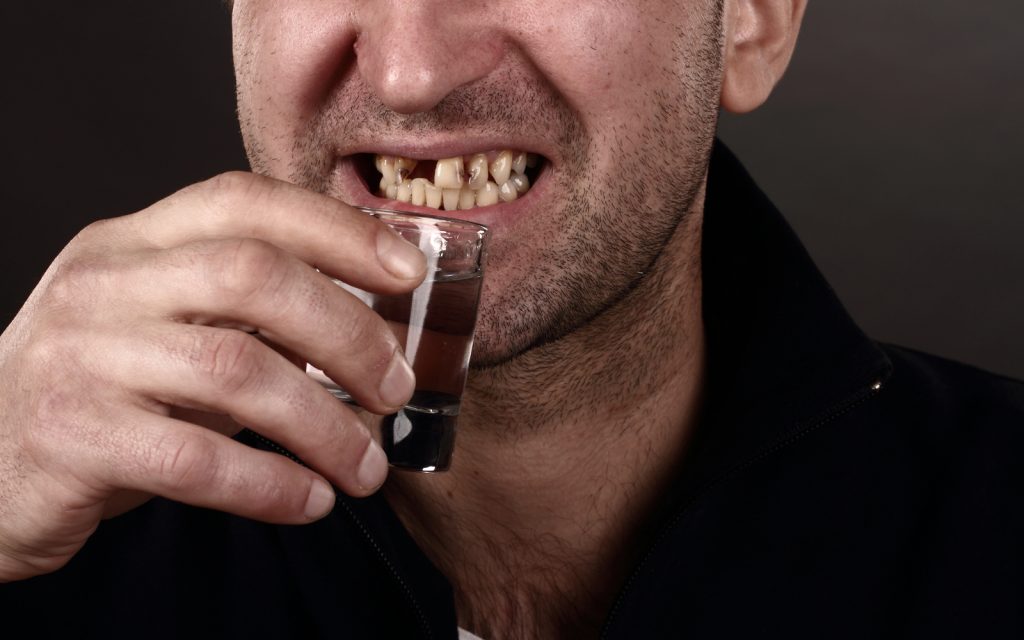Humans have had a love affair with alcohol since ancient times. Regardless if it is beer, wine or spirits, all booze is a psychoactive drug that is legally consumed in more than 100 countries. Liquor is highly popular for a myriad of reason including religion, medicinal and of course, pure pleasure. No matter why the elixir is consumed, individuals need to ensure that imbibing is backed by good oral hygiene, or a multitude of dental problems may ensue.
Ogden Nash said, “Candy is dandy, but liquor is quicker.” In relation to dental problems, a truer statement has never been made. When consumed in moderation, there are health benefits associated with drinking. The Mayo Clinic reports that moderate alcohol consumption can reduce the odds of developing heart disease including heart attack, may potentially minimize the risks of stroke, lower the changes of getting gallstones and potential lower the risk of developing diabetes. However, too much liquor can quickly destroy oral health and general well-being as individuals who consume too much liquor are at a higher risk for a myriad of dental woes. Excessive alcohol consumption may cause tooth erosion, dry mouth and up the odds of getting throat or mouth cancer.
Tooth Erosion
Unlike tooth decay caused by dental plaque bacteria, tooth erosion is “…a direct attack by the chemicals found in acidic foods and drinks,” including liquor. Dental erosion results from continuously low pH levels in the mouth and alcohol is a major contributor to the imbalance. In of itself, tooth erosion of tooth enamel is not life threatening, but it can increase discomfort due to tooth sensitivity, tooth discoloration, and cupping (when small indentations appear on teeth).
Dry Mouth
Liquor consumption will dehydrate a person making alcohol the worst option for quenching thirst. Courtesy of dehydration, the lack of water can increase the chances of a person developing dry mouth. Dry mouth is generally attributed to a lack of saliva production and saliva (98 percent water, 2 percent other compounds) is a body’s natural defense for washing away harmful dental plaque. Excess dental plaque is the cause of many dental conditions included tooth decay, cavities and periodontal disease.
Mouth Cancer
The Oral Cancer Foundation (OCF) has reported that for every hour of every day, someone in country loses his or her battle with mouth cancer. Alcohol consumption is considered to be one of the biggest causes of the disease. Excessive alcohol consumption can increase the production of oral squamous cell carcinoma. Those cells are responsible for 90 percent of the all mouth cancer cases and researchers believe that alcohol can irritate the mouth’s mucus lining and create a perfect haven for the cancerous cell growth.
Only a teetotaler would suggest giving up alcohol completely. Instead, moderation is the key to liquor consumption. Individuals should feel free to have a glass of their favorite alcoholic, but in order to counterbalance the potential threats proceeding with caution is advised.
Drinkers should pay special attention to brushing and flossing in order to combat the problems associated with consumption. Eating a nutritious diet and drinking clean, fresh water can also do wonders in regards to minimizing alcohols negative effect in regards to oral health. Imbibers should also maintain a regular schedule of dental exams and checkups as many times, a dentist can detect alcohol related dental problems and work aggressively to treat the issues. In regards to mouth cancer, a skilled dentist has the ability to pick up the symptoms during the earliest stages.

